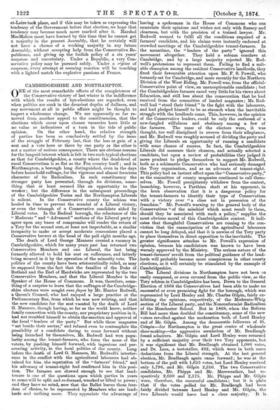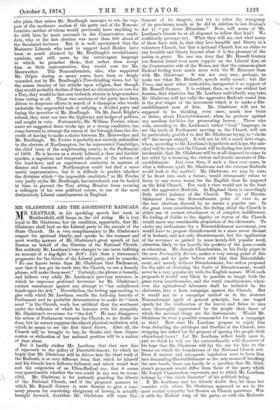CAMBRIDGESHIRE AND NORTHAMPTON.
ONE of the most remarkable effects of the completeness of the Conservative victory of last winter is the indifference with which the results of bye-elections are regarded, even when politics are sunk in the dreariest depths of dullness, and any movement at all in public affairs might be thought to import a wholesome change. We are apparently so far re- moved from another appeal to the constituencies, that the elections which occur upon chance vacancies have little or no value as indications of a turn in the tide of public
opinion. On the other hand, the relative strength of parties has been so conclusively settled by the issue of the struggle of February last, that the loss or gain of a seat and a vote here or there by one party or the other is not a matter of serious consequence. There are obvious reasons for the languid interest which is felt in two such typical elections as that for Cambridgeshire, a county where the dead-level of rural Conservatism is as flat as the Fen country itself ; and in Northampton, a borough long distinguished, even in the days before household suffrage, for the vigorous and almost ferocious character of its Radicalism. In each constituency the stronger party has presented, through its divisions, some- thing that at least seemed like an opportunity to the weaker ; but the difference in the subsequent proceedings of the Cambridgeshire Tories and the Northampton Liberals is salient. In the Conservative county the schism was healed in time to prevent the scandal of a Liberal victory, or even the triumph of a Conservative candidate aided by Liberal votes. In the Radical borough, the reluctance of the " Moderate " and " Advanced " sections of the Liberal party to agree upon any bases of compromise will render the return of a Tory for the second seat, at least not improbable, as a similar incapacity to make or accept moderate concessions placed a Conservative brewer at the head of the poll eight months ago.
The death of Lord George Manners created a vacancy in Cambridgeshire, which for many years past has returned two Conservative Members and one Liberal, the last being formerly allowed to hold his seat on sufferance, and latterly being secured in it by the operation of the minority vote. The politics of the county have been aristocratically ruled, as may be supposed from the fact that the families of the Duke of Rutland and the Earl of Hardwicke are represented by the two Conservative Members, and that the Liberal Member is the Speaker of the House of Commons. It was, therefore, some- thing of a surprise to learn that the suffrages of the Cambridge- shire electors were sought sans lava by Mr. Hunter Rodwell, a Queen's Counsel, who had enjoyed a large practice at the Parliamentary Bar, from which he was now retiring, and that the new candidate for the seat:vacated by the death of Lord G. Manners, though having, so far as the world knew, neither family connection with the county, nor proprietary position in it, had not troubled himself to obtain the sanction and approval of the local " leaders of the party." But while these magnates " sat beside their nectar," and refused even to contemplate the possibility of a candidate daring to come forward without being launched by themselves, Mr. Rodwell had won popu- larity among the tenant-farmers, who form the mass of the voters, by pushing himself forward, with ingenious and per- severing activity, in the local politics of the county. Long before the death of Lord G. Manners, Mr. Rodwell's interfer- ence in the conflict with the agricultural labourers had ob- tained for him the reputation of the "farmers' friend," and his advocacy of tenant-right had confirmed him in this posi- tion. The farmers are shrewd enough to see that land- tenure is one of the questions upon which parties in years to come will •be split and re-formed, wrecked or lifted to power; and they have no mind, now that the Ballot leaves them free- dom of choice, to be •represented by Members who are land- lords and nothing more. They appreciate the advantage of having a spokesman in the House of Commons who can enunciate their opinions and wishes not only with fluency and clearness, but with the precision of a trained lawyer. Mr. Rodwell seemed to fulfil all the conditions required of a farmers' candidate, and his claims were instantly endorsed at crowded meetings of the Cambridgeshire tenant-farmers. In the meantime, the " leaders of the party " ignored this movement altogether. They held a solemn conclave at Cambridge, and by a large majority rejected Mr. Rod- well's pretensions to represent them. Failing to find a suit- able champion among the resident Conservative landlords, they fixed their favourable attention upon Mr. F. S. Powell, who formerly sat for Cambridge, and more recently for the Northern Division of the West Riding. Mr. Powell was, from the official- Conservative point of view, an unexceptionable candidate ; but the Cambridgeshire farmers cared very little for his views about Education, and still less about the consecration that he had received from the committee of landed magnates ; Mr. Rod- well had " stood their friend " in the fight with the labourers, and had pledged himself to be as staunch when the inevitable struggle with the landlords came. This, however, in the opinion of the Conservative leaders, could be only the outbreak of -a new-fangled wilfulness and obstinacy among a few of the farmers. The mass of the electors were, it was thought, too well disciplined to swerve from their allegiance, and Mr. Rodwell was roughly accused of dividing the party and giving the Liberals an opportunity of running a candidate with some chance of success. In fact, the Cambridgeshire Liberals did measure their chances, and actually selected a candidate, but upon a review of probabilities they judged it more prudent to pledge themselves to support Mr. Rodwell, both as a schismatic Conservative who had seriously damaged the Tory organisation, and as an advocate of tenant-right. This policy had an instant effect upon the " Conservative party," as the committee of county magnates continued to call them- selves. Mr. Powell precipitately withdrew from the contest, launching, however, a Parthian shaft at his opponent, in the keen observation that it is a dangerous policy for the tenant-farmers to identify their type of Conservatism with a victory over " a class not in possession of the franchise." Mr. Powell's warning to the general body of the Conservatives " of the mischief which must result to them, should they be associated with such a policy," supplies the most obvious moral of this Cambridgeshire contest. It indi- cates that thoughtful Conservatives are coming to the con- viction that the emancipation of the agricultural labourers cannot be long delayed, and that it is unwise of the Tory party to place themselves in direct opposition to the inevitable. The greater significance attaches to Mr. Powell's expression of opinion, because his candidature was known to have been warmly approved by the Ministry. The serious nature of the tenant-farmers' revolt from the political guidance of the land- lords will probably become more conspicuous in other county elections, as it will certainly be stimulated by the example of Cambridgeshire.
The Liberal divisions in Northampton have not been E0 easily composed, or even covered from the public view, as the Tory schism in Cambridgeshire has been. Down to the General Election of 1868 the Conservatives had been able to make no successful or even promising fight for the borough, which was represented by Lord Henley and Mr. Charles Gilpin, fairly ex- hibiting the opinions, respectively, of the Moderate-Whig section of the Liberal party, and the Nonconformist Radicalism of the Manchester School. But in 1868, when the Reform Bill had more than doubled the constituency, some of the new voters revolted against the moderation both of Lord Henley and of Mr. Gilpin. Among the democratic- followers of St. Crispin—for Northampton is the great centre of wholesale shoe-making—the aggressive secularism of Mr. Bradlaugh found admirers. Mr. Gilpin and Lord Henley were returned by a sufficient majority over their two Tory opponents, but it was significant that Mr. Bradlaugh obtained 1,086 votes, and Dr. Lees, a teetotaller, 492, which were in both cases deductions from the Liberal strength. At the last general election, Mr. Bradlaugh again came forward ; he was at the bottom of the poll with 1,653 votes, but Lord Henley received only 1,796, and Mr. Gilpin 2,310. The two Conservative candidates, Mr. Phipps and Mr. Mereweather, had re- spectively 2,690 and 2,175. Mr. Phipps and Mr. Gilpin were, therefore, the successful candidates ; but it is plain that if the votes ,polled for Mr. Bradlaugh had been fairly divided between Lord Henley and Mr. Gilpin, the two Liberals would have had a clear majority. It is
also plain that unless Mr. Bradlaugh manages to win the sup- port of the moderate section of the party and of the Noncon- formists, neither of whom would previously have anything to do with him, he must succumb to the Conservative candi- date, who at the last election was more than 500 ahead of the Secularist lecturer. But it is well ascertained that the Moderate Liberals who used to support Lord Henley have been so much alarmed by Mr. Bradlaugh's revolutionary opinions, and still more by the extravagant language in which he preaches them, that rather than accept him as their representative, they would vote for Mr.
Merewether. The Nonconformists, also, who supported Mr. Gilpin during so many' years, have been so deeply wounded, not by Mr. Bradlaugh's Free-thinking views, but by the coarse ferocity of his attacks upon religion, that though they would probably decline, if they had no alternative, to vote for a Tory, they would in that case certainly abstain in large numbers from voting at all. These two sections of the party have been driven to desperate efforts in search of a champion who would undertake the ungrateful task of rallying a divided party and facing the invective of Mr. Bradlaugh. On Mr. Jacob Bright's refusal, they went out into the highways and hedges of politics, and sought in vain. Fortunately, Mr. William Fowler, whose name we suggested three weeks ago as a strong candidate, has come forward to attempt the rescue of the borough from the dis- credit of having to make a choice between Mr. Merewether and Mr. Bradlaugh. Mr. Fowler is probably not entirely unfamiliar to the electors of Northampton, for he represented Cambridge, the chief town of the neighbouring county, in the Parliament of 1868. He is known as a sturdy Liberal, a clear and forcible speaker, a sagacious and temperate advocate of the reform of the land-laws and an experienced authority in matters of finance and business. Northampton could not find a more useful representative, but it is difficult to predict whether the divisions which " the impossible candidate," as Mr. Fowler very justly styles Mr. Bradlaugh, has introduced, can be healed in time to prevent the Tory sitting Member from securing a colleague of his own political colour, in one of the most distinctively Liberal constituencies in England.



































 Previous page
Previous page